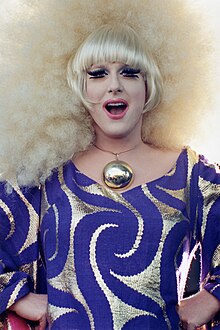| This article needs additional citations for verification. Please help improve this article by adding citations to reliable sources. Unsourced material may be challenged and removed. Find sources: "Wigstock" – news · newspapers · books · scholar · JSTOR (January 2010) (Learn how and when to remove this message) |
| Wigstock | |
|---|---|
 Lady Bunny and other performers during Wigstock 2000 at Pier 54, New York City Lady Bunny and other performers during Wigstock 2000 at Pier 54, New York City | |
| Inaugurated | 1984 (1984) |
| Founder | Lady Bunny |
Wigstock was an annual outdoor drag festival that began in 1984 in Manhattan's East Village that took place on Labor Day. Continuing, with a few gaps, until 2005, the festival would traditionally act as the unofficial end to the summer for the gay community of New York City. After a 12-year gap, the festival was revived by Lady Bunny and Neil Patrick Harris on September 1, 2018 at Pier 17 of the South Street Seaport in New York City. The name refers to the 1969 Woodstock Festival.
History
Hosted by co-creator Lady Bunny, the festival was held in its first years in Tompkins Square Park. According to Lady Bunny, the event began spontaneously in 1984 after a group of drag queens (along with Wendy Wild, NYC artist Scott Lifshutz and a couple of Fleshtones) became inebriated at the nearby Pyramid Club and decided to put on a show in the park.
In the mid-1990s, the Giuliani administration prohibited the festival being held in Tompkins Square and Union Square, and moved it to the Hudson River, effectively ensuring it would lose its grassroots activist appeal. Lady Bunny said that 2001's Wigstock would be the last, but in 2003, 2004, and 2005, Wigstock and Bunny returned to Tompkins Square, this time under the auspices of the Howl Festival.
Documentaries

In 1987, video artist Tom Rubnitz filmed a 20-minute documentary titled Wigstock: The Movie. Rubnitz's film captures the event's early improvised atmosphere; early years of Wigstock often made direct reference to Woodstock (including performance artist John Kelly's send-up of Joni Mitchell and her song "Woodstock"), and Rubnitz's film mimics aspects of the 1970 Woodstock concert film.
A second documentary titled Wigstock: The Movie was released in 1995; the festivals captured are larger and more polished, with rock music largely supplanted by house music, and the influence of the original Woodstock festival less evident. The 1995 film gained a wider audience and was distributed across the country, then released on video and DVD.
The 2019 film Wig by Chris Moukarbel explores the festival's origins, evolution, and 2018 incarnation.
References
- Bernstein, Jacob (15 August 2018). "Wigstock Returns From the Dead". The New York Times. Retrieved 10 October 2018.
- Helmore, Edward (2 September 2018). "Wigstock: New York's drag festival of sequins, stilettos and big hair is back". the Guardian. Retrieved 10 October 2018.
- Nett, Danny (4 October 2018). "Wigstock, 'An Iconic Piece of Drag History,' Lets Its Roots Show At 2018 Revival". NPR. Retrieved 10 October 2018.
- James, Caryn (9 June 1995). "Eyelashes Sufficient To Be Wigs". The New York Times. Retrieved 10 October 2018.
Further reading
- McKinley, Jesse (10 August 1997). "Wigstock's Resurrected, but Bring Money With the Mascara". The New York Times. Retrieved 10 October 2018.
- Ferber, Lawrence (11 September 2001). "Wigstock Curls Up and Dyes". The Advocate. pp. 61–62.
External links
Categories:- East Village, Manhattan
- Festivals in Manhattan
- Transgender events
- LGBTQ festivals in the United States
- LGBTQ history in New York City
- Recurring events established in 1984
- Recurring events disestablished in 2001
- Recurring events established in 2003
- Recurring events disestablished in 2005
- Drag events in the United States
- LGBTQ events in New York (state)
- History of gay men in the United States
- 1984 establishments in New York City